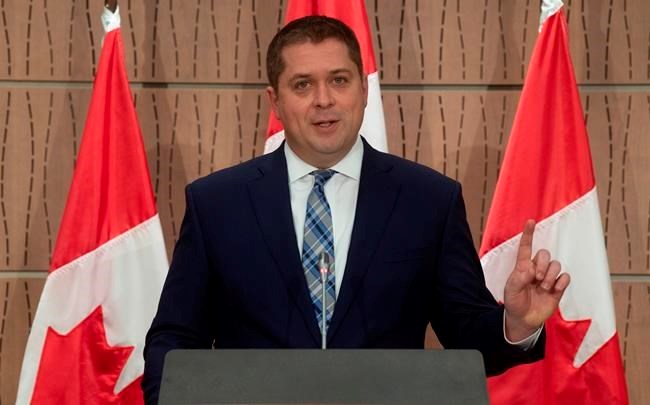OTTAWA — Talks that would scrap the scheduled return of Parliament next week are getting underway as all federal parties grapple with how to keep democratic institutions together while Canadians continue to be urged to stay apart.
MPs agreed March 13 to suspend Parliament as public health officials across the country began increasing restrictions on gatherings in an effort to slow the spread of COVID-19, but the agreement said Parliament would resume Monday, April 20.
As the death toll from COVID-19 rises, and physical distancing measures remain in effect, the Conservatives, NDP and Bloc Quebecois all said Tuesday that business as normal can't resume.
"It's pretty clear to all of us Parliament can't be sitting," NDP House leader Peter Julian said.
But the motion in March required all four recognized parties to agree the House must remain adjourned, otherwise it must return, and getting everyone onside will be the meat of talks this week.
Conservative Leader Andrew Scheer said Tuesday that while all 338 MPs can't gather, some compromise must be reached to allow regular "accountability sessions" that would give the opposition time to question and debate the government on its decisions, and also allow the minority Liberal government to introduce legislation it needs to deal with the pandemic in something akin to the usual way.
"The goal of this exercise is to get Canada through this crisis as best as possible," Scheer said.
"We want the government to get this right, we want them to make the right decisions at the right time, that's what this exercise is all about."
A spokesman for Pablo Rodriguez, the leader of the government in the House of Commons, said the government believes in the importance of Parliamentary accountability. Rodriguez's office asked the Speaker last week to explore how the House of Commons could hold virtual sittings.
"The Speaker clearly said that his team is working towards the goal of making virtual sittings of the House possible within three weeks from now," Mark Kennedy said in an email.
"We will continue to work collaboratively with other parties on this issue as we hold discussions this week, because that's what Canadians are expecting all of us to do."
Julian said the NDP favours a mix of in-person and virtual sessions that would give MPs from across the country a chance to represent their constituents.
Julian said last Saturday's sitting of Parliament to pass a second emergency aid package did lay some groundwork for the talks on what might happen after Monday.
Opposition parties had angled for a plan to return to Parliament to be included at the time, and did succeed in getting the number of committees that can now meet to debate COVID-19 related measures expanded.
The committee that oversees how the House of Commons works is also meeting to hash out potential scenarios for how Parliament could work. Its first meeting is scheduled for Thursday.
Julian said he's optimistic future agreements can be reached.
"People are approaching this in good faith," Julian said.
Saturday's sitting was the second one of Parliament since mid-March and was convened with the bare minimum of legislators in the House of Commons and Senate as negotiated by all parties.
Bloc Quebecois Leader Yves-Francois Blanchet said in a statement Tuesday that approach should continue.
"In all scenarios, Parliament should not meet beyond 32 MPs unless otherwise advised," he said.
"We are open to discussions for occasional meetings, comparable to what was done last Saturday."
The opposition parties have used their curtailed options to press the government to some effect in both the emergency sessions.
In the first, they were able to get the Liberals to strike highly contentious elements of their proposed aid legislation that would have extended the government's ability to tax and spend well into next year.
In the package passed over the weekend, the opposition negotiated the expansion of criteria for a massive wage-subsidy program, among other things.
This report by The Canadian Press was first published April 14, 2020.
Stephanie Levitz, The Canadian Press



